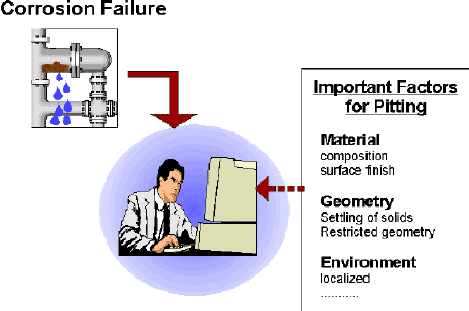
 |
Failure analysis involves metallurgical investigations of components, equipment, metals, alloys, coatings, linings and structures due to corrosion, environmental degradation and abuse, misapplication of the particular metal and mechanical failure. Studies of failure analysis are particularly strong in the chemical processing, refining, oil & gas and pulp & paper industries. Failure mechanisms evaluated usually include:
The identification of the factors associated with the forms of corrosion can guide failure investigators. A listing of the most important factors would ensure that engineers with little or no corrosion training are made aware of the complexity and multitude of variables involved. Inexperienced investigators would be reminded of critical variables that may otherwise be overlooked.
| Of all industrial problems which confronts engineers, few can be economically more important than the prevention of metallic corrosion and mechanical failure. The corrosion failure of metallic materials causes billions of dollars globally every year. The lack of understanding will not only cost a lot of money it will also cost human life. Preventing or reducing corrosion processes increases the productivity and efficiency of any plant. |  |
Some of the factors and information to be collected before, during , and after a corrosion failure investigation include the following: